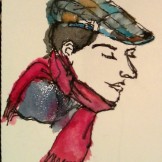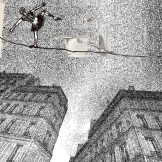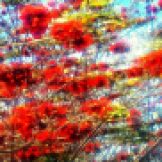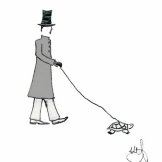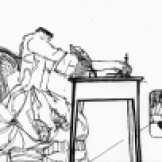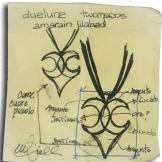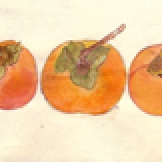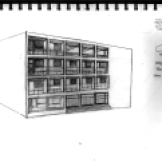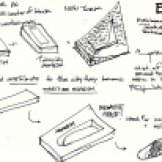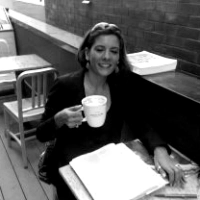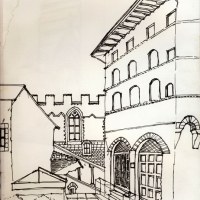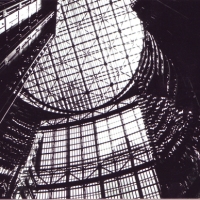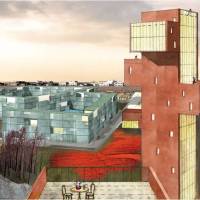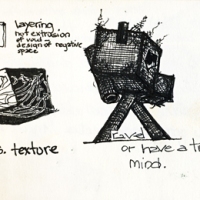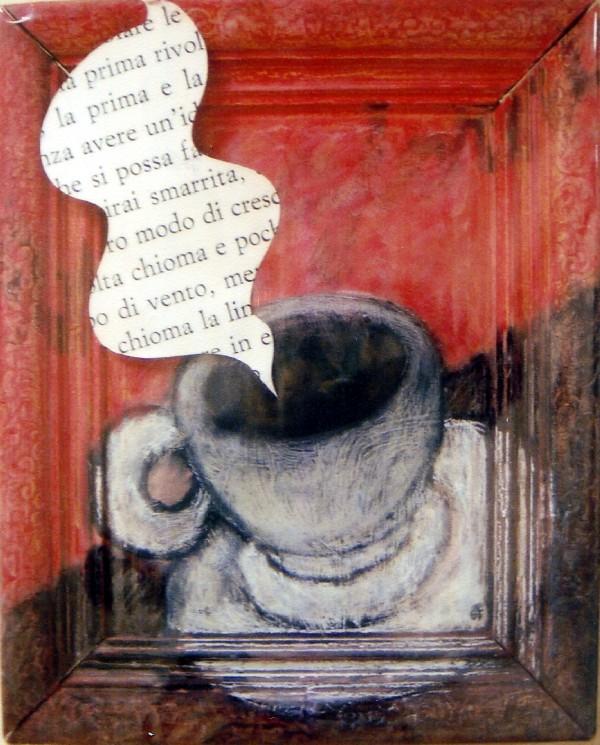Someday, somewhere — anywhere, unfailingly, you’ll find yourself, and that, and only that, can be the happiest or bitterest hour of your life.
Pablo Neruda
Archive for September, 2011
Chez Miti @Sea
Posted in Drawing, Ink, tagged Calabria, Drawing, ink, terrazza on September 29, 2011| Leave a Comment »
Finding and Losing Butterflies
Posted in art,poetry,writing on September 22, 2011| 6 Comments »

As I was grading students’ work today….butterflies came to greet me. These are my favorite flowers, the teacher’s apples.
Letters to Water
Posted in Drawing, Ink, sketchbook, Spontaneous Constructs, Thought in the Alley, Thoughts in the alley, tagged art, Drawing, inexistent, ink, letters, mailbox, unanswered, unopened on September 20, 2011| 2 Comments »
You can write anytime you like,
But you can never reach.
Present & Gifts
Posted in Design, Graphic Design, Link Love, tagged Birthday, blogsister, ghadah alkandari, giftbag, poetic, Pretty Green Bullet on September 12, 2011| Leave a Comment »
Dispatch from the Blackout: Entre Chien et Loup/Between Hope and Fear
Posted in Architecture, architecture, art,poetry,writing, Cures for the Nothing, Photography, photography, Poetry, Writing, writing, tagged 2011, bankers hill, blackout, caffe' letterario, city, espresso, Hillcrest, iniziative letterarie, José Luis González, La Noche que Volvimos a Ser Gente, people, Photography, Poetry, san diego, september 8, The Night We Became People Again, urban moments, Walking on September 11, 2011| Leave a Comment »
It has been ten long days since my last post, ten days of travels, of letters written and not sent, of (re) search.
In the middle of it all, I experienced the ‘biggest blackout in the history of San Diego county’. Thursday, September 8th, 2011, power went off for millions of people in Southern California, Baja California and Arizona. No ATM’s , shuttered stores, nowhere to buy food or water in a world where, when the machines stop, the city stops. The blackout lasted for almost nine hours, from 3.30 Pm till just before Midnight, and it was all it took to plunge my two neighborhoods in an atmosphere that was at times apocalyptic, at others, surreal, magical, “european”. Beyond the novelty, even excitement, felt by some there were people trapped in high-rise elevators, in trolley cars over canyons, in mid-rise buildings without water. It was a time where everything stopped and a battery radio and candles (my only emergency preparedness) help whiled away the hours. It was a movie. And a dream.
Before I share what I have been working on in the past few days, here is my dispatch from the Blackout and some urban moments caught on camera.
PS: From http://www.nakedtranslations.com/en/2004/entre-chien-et-loup nakedtranslations.com:
Entre chien et loup is a multi-layered expression. It is used to describe a specific time of day, just before night, when the light is so dim you can’t distinguish a dog from a wolf. However, it’s not all about levels of light. It also expresses that limit between the familiar, the comfortable versus the unknown and the dangerous (or between the domestic and the wild). It is an uncertain threshold between hope and fear.
The night we saw the stars.
Full moon, venus, motherlight.
Flaws and flames
Not multiplied
It is so quiet
we can hear ourselves
If the end of the world comes
I want you to know
We are fine.
Read ”La Noche que Volvimos a Ser Gente”or “The Night We Became People Again” by José Luis González, a short story on the big blackout in New York City.
If you are left with a battery powered CD player when the world ends- and speak italian- you could do worse than listen to Caffe’ Letterario.
Ballerina
Posted in Architecture, art, Collage, Digital Collage, Photography, Poetry, school, School Work, Writing, tagged architectural narratives, ballerina, Casablanca quote, cityline, Digital Collage, ink drawing, leopold lambert, poem, Poetry, RIetta Wallenda, suspended at 300 feet with no harness, the funambulist, tightrope dances, tightrope walker, woman on September 1, 2011| 1 Comment »
Nets
To Rietta Wallenda
Tightrope acrobats dance above safety nets
(or not)
Nerves taut like violin chords
Pulsing on neck, tendons stiff.
/
The fisherman spreads his father’s nets
Repaired a thousand times, damaged again
He sews his wounds on the beach
Fastens the corks
The old man with the young eyes
who listens to Mina and
–faraway look toward his sea,
a cigarillo in his mouth–
dreams of America.
/
Or, once a young girl
with a butterfly net
out to catch impossible sprites on hilly fields
Between highways
On the outskirts of the city.
You don’t know where I have been
and what I have seen.
/
The spider crochets his architecture
His gothic cathedrals
With divine geometry
With infinite patience
Behind the mirror.
August 2011

From British Pathe':'This 1931 video shows a woman dancing on a high wire suspended 300 feet in the air. We think this was shot in an American city possibly New York. Click to vertigo.'
Addendum September 5, 2011:
A search on the term ‘funambulist’ and inquiries about Moussavi’s “Function of Ornament” led me to find an incredible blog and post:
The editor is a fellow ‘literary architect’ interested in theory, film, art, books.
Won’t you join me down the rabbit hole of Borgesian architecture for a read of ‘Aleph’?
This could be the beginning of a beautiful friendship.





















